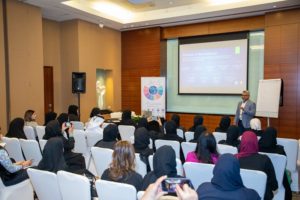Creating A Future-Proof Government The Topic On The First Day Of The Fourth UAE Public Policy Forum
Preparing the UAE government for the far-reaching changes being brought by the Fourth Industrial Revolution was the theme of the workshops held at the fourth UAE Public Policy Forum (UAE PPF 2020) – an event organised by the Mohammed bin Rashid School of Government (MBRSG) in collaboration with the Mohammed bin Rashid Centre for Government Innovation (MBRCGI).
‘Design for Success: Exploring Agile in the Public Sector’ was the title of the opening Panel in an agenda that saw experts from around the world exploring how to make governments more agile. The panel in this first activity examined how to increase federal and local government responsiveness in what is a fast-moving digital age.
H.E. Huda Al Hashimi, Assistant Director General for Strategy and Innovation, Prime Minister Office, UAE, used this first session to highlight the Dubai Future Accelerators programme – which recently closed applications for its Cohort 7 – as a dynamic collaboration between government entities and the private sector, start-ups and innovative SMEs. “Agility’ stretches beyond flexibility and innovation, and covers the whole spectrum of advanced government. We see changing expectations and citizens’ demands of governments are higher. It’s not always about being disruptive – it’s about stabilising and being resilient,” she said.
Torsten Anderson, Deputy Director General at the Danish Business Authority, Denmark, said it started the agility process by reorganising traditional government practices and introducing new laws that are future-proofed and digital focused. “But if you do this as a tick-box exercise, it doesn’t work. We looked more at culture and putting users at the centre of what we do.”
Owain Service, Former MD and Co-Founder of the Behavioural Insights Team, UK, agreed that it’s important to understand systems and processes through the eyes of those using them. He said governments need to combine internal knowledge with external input from the private sector and academia. “Don’t assume insiders or outsiders can do it by themselves,” he said.
Concluding the first discussion, H.E. Al Hashimi said agility depends on empowerment, being pre-emptive, foresights and flexibility. Referring to UAE Centennial 2071, she said no nation has announced it is planning so far ahead. “How can we strategise and reap the benefits? That’s why agile government is so critical, to stand strong and be able to achieve our leadership’s vision,” she commented.
‘Impulse: Technology, Policy, and Behavioural Science’ was the next session on the agenda, with Owain Service, Former MD and Co-Founder of the UK-based Behavioural Insights Team, speaking about the founding principles of how people process information: the fast system and the slow system, with the former representing subconscious activities and decisions that individuals take on daily basis and the latter comprising activities and decisions that are reflective and require active attention and processing.
Service went on to explain that policy-making happens with a slow system where issues are carefully studied with a 360 degree approach to come up with policies agile enough to tackle all challenges. He gave examples of policies adopted in the UK that follow the ‘choice architecture’ notion, with choice architecture being a system to encourage people to change their behaviour. He concluded by explaining that solutions to challenges are not policies in themselves, but rather products that address pressing issues, such as climate change, on the individual level.
A sideline workshop on the first day of UAE PPF 2020 offered attendees an insight into how Emotional Intelligence (EI) and Artificial Intelligence (AI) can collectively lead and promote an agile and healthy global work environment. Led by Dr Vijay Pereira, Associate Professor of Human Resource Management at the Khalifa University of Science & Technology, and Mrs. Daicy Andrade, Research Assistant at the Department of Humanities and Social Sciences at Khalifa University, the session explored what aspects of EI can contribute to effective design of AI applications, as well as the impact of AI implementation on employees’, customers’ and other users’ emotional and psychological states.
The presentation examined human consciousness, outlining the successive steps of awareness, from ‘Unconscious Incompetent’, where individuals don’t know there is a skill they are lacking, to ‘Conscious Incompetent’, where they are aware of their need for skills, before moving on to ‘Conscious Competent’ – the acquisition of the skills and knowledge they need through practice, and finally, to ‘Unconscious Competent’, where the skills are exercised effortlessly.
With its title ‘Industry 4.0 and Being Future-Proof,’ the following panel explored how the Fourth Industrial Revolution affects policy goals, the policy process, and implementation. Moderated by Dr. Denise Gossage, Advisor for Economic Policy Research at MBRSG, the session brought together H.E. Dr Saeed Al Matrooshi, CEO and Secretary-General at the Ajman Executive Council; Prof. Sid Ahmed Benraouane, Advisor Chair US-ISO Innovation Working Group at the University of Minnesota; Marten Kaveats, National Digital Advisor of the Government Office of Estonia; and H.E. Massimo Falcioni, CEO of Etihad Credit Insurance.
“The UAE led the way in setting plans for the future,” asserted H.E. Al Matrooshi. “The only issue is that the technology is changing very fast. We still have progress to make in terms of changing the mindset, especially among government agencies that refuse to share their data – even with other departments.”
Prof. Benraouane focused on an AI application developed for the police department. “The police model has not changed in the last several centuries,” he said. “We sought to transform it using Artificial Intelligence. A prominent trend in police work is predictive analytics, where data can help predict some issues such as car accidents and traffic, allowing us to better allocate our resources.”
“We can’t predict the future but we can build systems that can adapt to changes,” noted Kaveats, for his part, revealing that Estonia has already introduced 25 AI-powered applications, with many more in the pipeline. “Technology is changing fast, and so are people’s expectations. They are changing faster than our governance systems can, and with that in mind, we need to build a mindset open for innovation.”
“Humans cannot be replaced by machines,” insisted Falcioni. “As soon as new technology steps in, we need to manage this breakthrough and develop the necessary skills to embrace it. People have to learn to do their jobs in a different way. AI can take over the data gathering part of the job, freeing employees up to do more thorough analysis.”
The first afternoon session saw H.E. Sonny Leong CBE, Chief Executive, Civil Service College, UK speak in a personal capacity about the positive changes in UK government structures and the challenges it faces ahead in ‘Lessons from the UK.’ He highlighted how 1,882 previously “cumbersome” websites connected to government services in 2012 had been streamlined into one portal, the Government Digital Service (GDS). “The user interface is simple and experience is fantastic,” he said. “The GDS isn’t situated in Westminster but in east London, and it’s styled like Google and Facebook – open ’24 7’ with young creative people who have brought technology to the forefront of government.”
Highlighting how the UK Civil Service is a “gold standard” which is impartial of political parties, he commented that the country’s last three elections that occurred in relatively quick succession had impacted continuity. “I do envy the UAE with its 100-year vision, – we’re lucky if we get five years with our electoral cycle,” he said.
Post-lunch, three directors from Palmwood, a social impact foundation which blends design and government, took to the stage to show how design is a human-centred methodology and mindset for creative problem solving.
Mitch Sinclair, Palmwood Creative Director, said: “We’re fundamentally shifting the dynamic, from top-down power to a model of empowerment, lifting from the ground up.” Accompanied by Palmwood COO Reem Al Zarouni and Senior Director Volker Roos, she stressed the importance of embracing diverse teams to boost cross-entity collaborations and showed slides in which creativity was nurtured in children and the elderly.
Delegates were given a ‘30 Circles Challenge’ exercise in creative agility, which saw them drawing as many identifiable objects in 30 circles in one minute.
Day one of the UAE Public Policy Forum 2020 included a press conference showcasing several MBRSG publications The activity was attended by H.E. Dr. Ali Sebaa Al Marri and Prof. Raed Awamleh, along with Fadi Salem, MBRSG’s Director of Research and Advisory; Melodena Stephens, Professor of Innovation Management at MBRSG; Dr. Yousif Al Ghalayini, Assistant Professor in Public Administration and Executive MPA Programme Coordinator at MBRSG and Dr. Immanuel Azaad Moonesar Masters of Public Policy programme coordinator.
The conference included the launch of the second edition of ‘Dubai Policy Review (DPR)’ – the thought-leadership policy journal published by MBRSG to advance the future of public policy and government quality. Publications highlighted at the conference included ‘Business with Purpose: Advancing Social Enterprise’ by Melodena Stephens, which focuses on organisations, initiatives and start-ups with strong social innovation characteristic that work towards sustainable living at the individual or community level.
‘Public Administration Theory’ by Dr. Yousif Al Ghalayini, which introduces and assesses the principles and theories of public administration and discusses the changes in the scope and management of the public sector over the last century; was another highlighted publication at the conference, as was ‘Future Governments’ edited by MBRSG’s Melodena Stephens, Mona Mostafa Elsholkamy, Immanuel Azaad Moonesar, and Raed Awamleh. The title presents case studies from various countries and their experiments with policy under five broad themes: government foresight, future orientation, regulatory reforms and strategy, the happiness agenda, and the sharing economy. MBRSG also announced the publication of eight government reports during the conference.
UAE PPF 2020 and its theme ‘Agile Government: Becoming Future-Proof’ is held under the patronage of H.H. Sheikh Hamdan bin Mohammed bin Rashid Al Maktoum, Crown Prince of Dubai and Chairman of the Dubai Executive Council. Taking place February 17-18 at the InterContinental Dubai – Festival City, the event is organised by the Mohammed bin Rashid School of Government in collaboration with the Mohammed bin Rashid Centre for Government Innovation.









